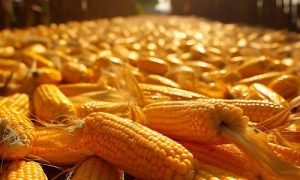In Punjab, farmers turn to growing corn in spring, hit by seed shortage, raisde groundwater worries

Punjab farmers are increasingly opting for spring maize after harvesting potatoes, but seed shortages and groundwater concerns persist. Experts recommend drip irrigation to mitigate depletion, while PAU discourages summer maize cultivation due to excessive water use. Black marketing of maize seeds has added to farmers’ woes. PAU promotes groundnut as an alternative to reduce groundwater stress.
Chandigarh: Punjab farmers are increasingly turning to spring maize, or corn, after harvesting potatoes. However, while seed shortage is hindering them, agriculture experts are worried over the need to adopt water-saving irrigation practices to address groundwater concerns. Summer maize cultivation continues to be driven by demand for silages and ethanol units. The state agriculture department and PAU don’t recommend sowing of summer maize (Apr-Jun) after the harvesting of wheat crop as it exacerbates the decline of the water table. For spring maize too, farmers are being advised to use drip and sub-surface irrigation practices. The growing trend among potato farmers to sow spring maize in Jan-Feb has escalated concerns over groundwater depletion.
Meanwhile, farmers are complaining of shortage of seeds. Palwinder Singh, a potato farmer from Amloh, said harvesting for potatoes had begun, but farmers were facing problems in getting maize seeds at the right price. “There is black marketing of seed varieties like 1890 and 1899. The four-kg pack of maize seed priced at Rs 2,600 is being sold for Rs 3,500 in the black market. Farmers need two packs for sowing in one acre. Maize sowing starts from Jan 20 and goes on till March. Farmers otherwise fetch good prices as summer maize is bought by dairy farms and is also used in ethanol plants,” he said.Gurvinder Singh Bajwa, a progressive farmer from Gurdaspur, added maize seeds are not available with bills and farmers are forced to buy it in black market. “Farmers have been anxious about non-availability of seeds. The crop has picked up in places where potato is cultivated. The crop comes with the advantage of good yield and is resistant to infections, but farmers will suffer losses if they delay sowing beyond February,” he said.
A dealer of agriculture products said maize seeds are procured by seed companies in southern states and there has been some delay in delivery. He, however, added there were several alternatives available and farmers should not go after the seeds of a particular company alone. “Distributors have started getting supplies and things should improve in coming weeks,” he said.An official said raids were being regularly conducted to check black marketing and hoarding. “Farmers should only buy certified seeds that too with proper bills,” he advised.A faculty member at PAU said the varsity outrightly rejected summer maize cultivation as it amounted to sowing a second batch of paddy in a year and took a toll on the watertable. At the same time, potato and pea growers, who sow maize in relatively cooler season in Jan-Feb should also adopt drip and sub-surface irrigation practices, he said. Sowing maize (corn) in April requires 20-25 irrigation cycles to mature, and it speeds up the depletion of subsoil water.PAU recommends strict adherence to the sowing window from Jan 20 to Feb 15 and promotes the adoption of water-efficient practices such as raised-bed planting with mandatory drip irrigation.
Groundwater concerns over summer (kharif) maize cultivation, sown in mid-April after the wheat harvest, is even more severe than spring maize due to its excessive water requirements (105cm-120cm as compared to 40cm in spring maize).Jaswinder Singh Brar, agriculture expert, said findings of a field study in Moga revealed that maize planted using pneumatic planters needed less irrigation as compared to ridge-sown method. When contacted, Punjab director (agriculture) Jaswant Singh said farmers should go by the PAU advisory and not fall in the trap of seed and agriculture product dealers. “As it is, summer maize crop is not recommended by the agriculture department or PAU as it is a drain on groundwater and farmers,” he said.
PAUPAU has been trying to revive groundnut cultivation as an alternative to spring maize in districts like Kapurthala to address groundwater depletion concerns to make farmers break the crop rotation pattern of potato-spring maize-paddy.
To read more about Maize News continue reading Agriinsite.com
Source : The Times Of India
















